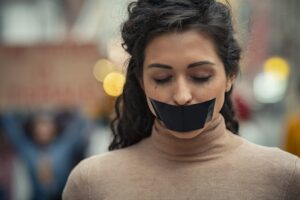Since 2015, sexual assault has been the most reported crime on cruise ships
Hospitality and Leisure are the two sectors where sexual harassment is most prevalent, in fact, sexual assault is the highest reported cruise ship crime, and the numbers are worsening. This problem, pervasive yet often underreported, affects both passengers and crew members, casting a shadow over the glamorous facade of cruise vacations.
The Scope of the Problem
Sexual harassment on cruise ships can take many forms, including unwelcome advances, inappropriate touching, lewd comments, and sexual assault. Since 2015, sexual assault has been the most reported crime on cruise ships, with more than 450 cases reported between 2015 and 2022. In 2023, the number increased to an all-time high of 131 cases reported to the FBI. The true number is unknown due to the nature of ships sailing from port to port. According to reports and studies, incidents of sexual harassment and assault on cruise ships are more common than many might expect.
In 2019, the U.S. Department of Transportation reported 101 allegations of sexual assault on cruise ships involving major cruise lines, highlighting the severity of the issue. It’s important to note that these figures might only represent a fraction of the actual number of incidents, as many cases go unreported due to fear, shame, or a lack of confidence in the reporting process.
Under maritime law a shipowner is strictly liable for sexual assaults on passengers or other crew members, which means that it can be held responsible even if it was not negligent or itself at fault.
Factors Contributing to Sexual Harassment on Cruise Ships
- Isolation and Power Dynamics: The isolated nature of a cruise ship, where passengers and crew are confined together for extended periods, can create power imbalances. Crew members, who often come from diverse backgrounds and may rely heavily on their jobs, might feel powerless to report harassment by colleagues or superiors.
- Inadequate Training and Policies: While many cruise lines have policies against sexual harassment, the effectiveness of these policies can vary. Inadequate training for staff on recognising and preventing harassment, coupled with inconsistent enforcement of policies, can leave victims vulnerable.
- Jurisdictional Challenges: Cruise ships operate under complex legal frameworks, often sailing under flags of convenience from countries with varying laws and regulations. This can complicate the reporting and prosecution of sexual harassment cases, leaving victims without clear avenues for justice.
Efforts to Address the Issue
In recent years, there has been growing recognition of the problem and efforts to address it. Some cruise lines have implemented measures such as:
- Enhanced Training: Providing comprehensive training for staff on recognising and preventing sexual harassment.
- Clear Reporting Channels: Establishing clear, confidential channels for reporting incidents.
- Support Services: Offering support services for victims, including counselling and medical assistance.
- Surveillance & Security: Increasing surveillance in public areas and ensuring that security personnel are adequately trained to handle harassment cases.
To effectively address and prevent sexual harassment on their ships, cruise liners should implement a comprehensive strategy that includes the following measures:
Robust Training Programs
- Mandatory Training: Conduct regular, mandatory training for all staff and crew members on recognising, preventing, and responding to sexual harassment.
- Scenario-Based Learning: Use realistic scenarios to train staff on how to handle different situations involving harassment.
- Ongoing Education: Provide continuous education and refresher courses to ensure that staff are up to date on policies and procedures.
Clear and Accessible Reporting Channels
- Anonymous Reporting Options: Establish anonymous and confidential reporting channels for victims and witnesses to report incidents without fear of retaliation.
- Multiple Avenues for Reporting: Offer various ways to report harassment, including hotlines, mobile apps, and direct contacts with designated onboard officials.
- Prompt Response Protocols: Ensure that all reports are taken seriously and responded to promptly with appropriate actions.
Support Services for Victims
- Immediate Assistance: Provide immediate access to medical and psychological support for victims of harassment.
- Secure Evidence: Secure and preserve evidence in the case of sexual assaults.
- Counselling Services: Offer ongoing counselling services to help victims cope with the emotional aftermath of harassment.
- Victim Advocates: Assign trained victim advocates who can guide and support victims through the reporting process and any subsequent actions.
Enhanced Surveillance and Security Measures
- Increased Surveillance: Install more security cameras in public and vulnerable areas of the ship to deter potential harassers and provide evidence if incidents occur.
- Patrols and Security Presence: Increase the number of security personnel on board and ensure they are visible and accessible to passengers.
- Emergency Response Plans: Develop and regularly update emergency response plans specifically for handling incidents of sexual harassment and assault.
Strong Policies and Enforcement
- Zero-Tolerance Policy: Implement a clear zero-tolerance policy for sexual harassment, communicated to all staff and passengers.
- Consistent Enforcement: Ensure that policies are consistently enforced, with disciplinary actions taken against offenders, regardless of their position.
- Policy Awareness: Regularly remind both staff and passengers of the policies through meetings, announcements, and visible postings around the ship.
Collaboration with External Authorities
- Partnerships with Law Enforcement: Establish strong partnerships with local and international law enforcement agencies to ensure proper handling of serious cases.
- Legal Frameworks: Navigate and comply with the complex jurisdictional laws that apply to incidents occurring on international waters.
- Expert Consultation: Work with experts in sexual harassment prevention and response to continuously improve policies and practices.
Fostering a Respectful Culture
- Promote Respect and Inclusivity: Create a culture of respect and inclusivity through regular training, workshops, and awareness campaigns.
- Leadership Example: Ensure that leadership at all levels models respectful behaviour and swiftly addresses any incidents of harassment.
- Feedback Mechanisms: Establish channels for receiving feedback from both staff and passengers about their experiences and any concerns regarding harassment.
By taking these steps, cruise liners can create a safer and more respectful environment for both passengers and crew members, reducing the prevalence of sexual harassment and ensuring a positive experience for everyone on board.
How We Can Help
When dealing with workplace harassment, prevention is better than cure. Engaging with your employees and raising awareness of the issue, ensures that staff understand what unacceptable behaviour is and ensuring effective reporting mechanisms are in place.
Staff training is key to avoiding incidences of sexual harassment occurring. A workplace environment based on tolerance and free from hostility will enable people to contribute more effectively.
We will also ensure that policies and procedures are fit for purpose and compliant with legislation.
We provide an end-to-end service ensuring that employers are provided with advice and support. We will provide training for staff and managers to build a workplace culture that is inclusive, fosters openness and transparency and promotes respect.
The training will also make sure that employees fully understand policy and procedures. It will also provide staff with the knowledge to help them to recognise inappropriate behaviour, for example use of nicknames in the workplace and what may sit behind them. The training will help prevent inappropriate behaviour in the workplace and give staff and managers the tools on how to deal with it.
In the case of reports of sexual harassment, we will conduct a professional, confidential and independent investigation, providing a thorough report and highlight any individual or organisational learning along with recommendations. We will also assist with any disciplinary hearings or appeals.

Marie Carmichael
Specialist in New Worker Protection Act Marie brings to United Outcomes an invaluable depth of expertise, particularly in fostering new worker protection under the Protection Act. With a 32-year commendable career in policing, Marie has honed her skills in safeguarding, multi-agency collaboration, and HR practices. Her PIP 2 accreditation and extensive experience in managing complex investigations, alongside her dedication to promoting safe, ethical work environments, positions her as a leading figure in implementing robust worker protection strategies. Marie's background in education and workplace investigations enriches her approach to conflict resolution, ensuring compliance and enhancing workplace safety and harmony.


